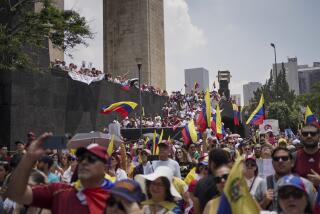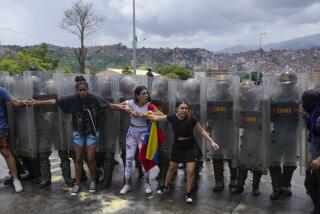Both Sides Say They’re Ahead in Chilean Vote : Millions Turn Out Early to Choose Between New Term for Pinochet or Multi-Party Democracy
- Share via
SANTIAGO, Chile — The government and the opposition both claimed an early lead Wednesday in a plebiscite on Gen. Augusto Pinochet’s attempt to win eight more years in power rather than resume Chile’s traditional multi-party presidential elections.
The coalition opposing Pinochet said that results of the first 531,000 votes, or 7.45% of the ballot, produced a lead of 62% to 37%. Genaro Arriagada, executive secretary of the No Command, said the results, based on the opposition’s parallel vote count, suggested a “significant trend.”
Deputy Interior Minister Alberto Cardemil said the government’s count put the Yes vote ahead, but by a far narrower margin of 51.3% to 46.5%. The government count covered just 186,000 votes out of a potential electorate of 7.4 million.
Millions Vote Early
With tensions heightened by a blackout on the eve of the plebiscite, millions of voters turned up early at the 1,000 polling stations in the first presidential vote since Pinochet’s coup on Sept. 11, 1973.
Extraordinary scrutiny by opposition parties and inexperience by election officials slowed the pace of balloting, but there were no reports of significant irregularities.
The vote was a simple “yes” or “no” to eight more years of rule by Pinochet, who toppled Chile’s last elected government of Marxist President Salvador Allende.
An opposition coalition of 16 parties, ranging from left to center-right, defied skeptics by generating a potent campaign against Pinochet. The No Command said Pinochet’s defeat would open a path to full democracy, belatedly following a pattern set during the 1980s in other Latin American countries.
Pinochet, the 72-year-old army commander in chief, shed his uniform to campaign as the man who saved Chile from communist totalitarianism and civil war. Pinochet argued that he alone offers true democracy, stability and the sustained economic growth that his supporters describe as unprecedented in the region.
The No coalition claimed that Pinochet’s defeat was assured but called on the public to vote early, then go home and await the results and avoid street celebrations that could lead to confrontation.
Eerie Calm
An eerie calm descended on downtown Santiago and its suburbs after the polls closed as Chileans anxiously awaited results.
On Tuesday night, a blackout darkened a 1,000-mile swath of central Chile. Nerves were already jangled by rumors that Pinochet’s forces, in the face of defeat, might provoke violence to justify canceling the plebiscite or annuling the result.
At least six explosions that shook Santiago on Tuesday night, which turned out to be “noise bombs,” exacerbated the atmosphere of apprehension.
Western diplomats and State Department officials said they took the rumors seriously.
Thousands of soldiers and riot police were deployed around Santiago and other cities to watch over polling stations, customary in Chilean elections.
‘I Am a Soldier’
Pinochet, asked about possible unrest, told reporters before he voted: “I am a soldier. When they threaten me, instead of being worried, I’m just the opposite. I’m calm, waiting for them to act.”
Asked how the vote would turn out, he said, “I’m always optimistic.”
Voters stood in slow-moving lines that stretched for blocks. National television said two elderly people died while waiting to vote, while two women gave birth. The lines were orderly and nearly silent, and people showed no sign of wavering in their determination to vote, despite the delays of many hours.
“We hope for work for all men and women, and freedom,” said 78-year-old Adela Perez in the poor area of La Victoria, when asked why she was voting No. “Pinochet says we are fine, but it’s pure lies.”
‘People Want Unity’
An elderly Yes voter at the National Stadium polling station said: “This is different from other elections. I’ve never seen such peace and calm as today. The people are more conscientious. They want unity.”
Even as a loser, Pinochet would retain enormous power. The 1980 constitution, drafted by the military and approved in a disputed plebiscite, calls for him to remain president for another year until an election in December, 1989. He would stay on as army commander and be a senator for life.
But the opposition said Pinochet’s defeat would be a mandate from the people for open elections and full democratic rule. Patricio Aylwin, leader of the No Command and president of the Christian Democratic Party, said the opposition would seek negotiations with the military to agree on a transition plan if the No vote wins.
A year ago, no one could have imagined that Chile’s opposition--traditionally splintered--would be able to mount a sustained and united front against Pinochet. Most expected the plebiscite to be a walkover, given the government’s overwhelming domination of television and patronage system.
Work Together
But the main opposition parties declared in February that they would work together against Pinochet. Even though they viewed the process as illegitimate and the constitution as invalid, the parties declared the plebiscite to be the only avenue open to challenge Pinochet.
Voter registration exceeded all expectations, reaching 7.4 million, or 92%, of the potential voters aged 18 and over. Pinochet lifted states of emergency and allowed exiles to return home, and the government agreed to provide the opposition with 15 minutes of uncensored television time each night for the last month of the campaign.
The No publicity included dramatic criticism of human rights violations by Pinochet’s regime and attempts to discredit the government’s “economic miracle” by arguing that the poor are worse off than ever.
The pro-government campaign emphasized the dangers of a return to the past, as well as the divisions that ravaged Chile before the coup, with the slogan “Yes or Chaos.”
22,247 Tables
Observers from three nationally registered opposition parties--the Christian Democrats, the Party for Democracy and the Humanist Party--dispatched poll watchers to the 22,247 election tables across the country to scrutinize the voting.
More to Read
Sign up for Essential California
The most important California stories and recommendations in your inbox every morning.
You may occasionally receive promotional content from the Los Angeles Times.










